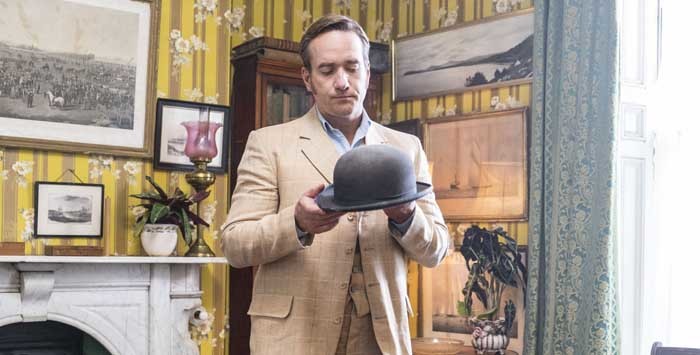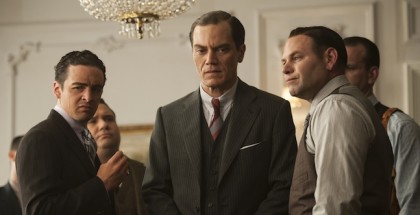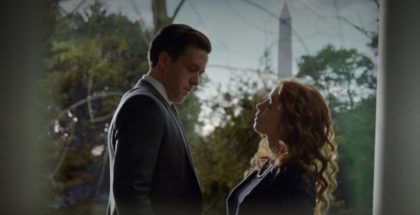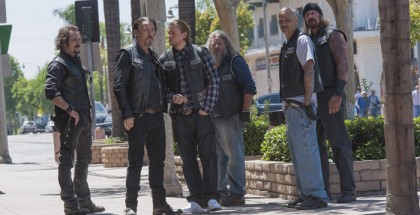Amazon Prime Video UK TV review: Ripper Street Season 4, Episode 1 and 2
Review Overview
Cast
8Spectacle
6.5Scale
8David Farnor | On 15, Jan 2016
Read our interview with Matthew Macfadyen and Adam Rothenberg here.
Episode 1 of Ripper Street Season 4 airs on BBC Two at 10pm on 22nd August. This is a spoiler-free review of Episode 1 and 2, which are available as a double-bill on Amazon Prime Video, so if you wish to avoid knowledge of the broad set-up of Episode 2’s storyline, wait until after Episode 1 to read this.
Ripper Street is back – and the times, they are a-changing. After last year’s resurrection for a third season by Amazon, the show is now firmly a part of the streaming site’s original line-up. On screen, meanwhile, we’ve jumped forward to 1897, the year of Queen Victoria’s Diamond Jubilee. We learn that in no time at all, as the show opens not with a shot of its main character, but of Her Royal Highness.
It’s an unexpected start to the show’s fourth run, but one that speaks volumes about how confident the series – and its creator, Richard Warlow – has become. Season 3 began with a bang in the form of a locomotive disaster that set our characters on a collision course with each other. Season 4 doesn’t have that immediately gripping set piece to hook you in, but the ramifications of that railway crash are still being felt; this is a show that believes in the long game, developing its characters over weeks and months and years.
Two years on, they’re all in different places, but still dealing with the fallout. Reid (Matthew Macfadyen), now reunited with daughter Mathilda (Anna Burnett), has retired by the seaside. Bennet Drake (Jerome Flynn) has taken over H Division, with a new team of bobbies underneath him (including Harry Potter’s Matthew Lewis) and wife Rose Erskine (Charlene McKenna) finally on his arm. Long Susan (MyAnna Buring), meanwhile, languishes in prison, awaiting a date with the hangman for her part in the tragedy of 1895.
The cast ease back into their roles like a warm bath; you can practically see them wiggling their toes and stretching out to new extremes. It helps that the costume design team are as impeccable as ever, subtly moving us forward in time, while still keeping everyone reassuringly familiar. Reid, for example, is reintroduced to us without his hat – an alien sight that immediately makes his beach life feel unnatural.
Macfadyen remains reliable as the stoic detective, attempting to play happy families with his daughter, but still hankering for the crime-solving days of old. His inevitable return to Whitechapel is hardly surprising, but his unhappiness is never spelled out to us; rather, we catch a glimpse of it during one romantic scene that is played for disturbing effect rather than intimacy.
The case that does bring him back is the arrest of an old friend, Isaac Bloom (Justin Avoth), under suspicion of murder – something that Reid believes is simply not possible. That, again, is far from an original twist, but it subtly widens the scope of the series: Isaac’s arrival also heralds the appearance of Whitechapel’s Jewish community (watch out for David Warner).
At the same time, we see Drake investigate a corpse at the local docks – a routine dead body scenario that also introduces another side of Warlow’s period London. That, in turn, leads us to the Muslim Patriotic League, a group who are a part of unrest being stirred up in the capital.
All of this plays out against Victoria’s anniversary, a coming-of-age moment for the British Empire, which has become a melting pot of cultures and religions. It’s a strikingly modern set-up – our friendly neighbour journalist now bothering the police is the forthright Miss Costello – and Warlow doesn’t shy away from the echoes to modern multi-cultural Britain. “Extreme beliefs beget extreme actions,” says one character, the kind of line that wouldn’t be out of place in a show set in 2015. (The use of terms such as “moon faces” among hooligans, though, takes us back down to the 19th century with a cruel bump.)
There are advancements too, in the technology Whitechapel is using to fight crime, with the new fangled police station boasting everything from a telephone to a microreader (Reid’s massive archive writ small). A tour of the shiny HQ is thrilling in itself, providing a clever chance for the budget to show off and the script to jostle us up to speed, not to mention the joy of seeing Reid and Jackson geeking out over the hydraulics used in the morgue.
Jerome Flynn, who gets a welcome chance to take charge of events, soaks up the extra screen-time like a crumpet absorbing butter, his craggy, world-weary surface oozing with juicy character. But if Season 3’s step up in quality was due to the expanded role of Long Susan, elevating her from supporting character to straight-out villain, Season 4’s MVP emerges as Captain Homer Jackson.
Adam Rothenberg has always revelled in his alcoholic womaniser’s boyish charms, but with Long Susan’s life on the line, he’s never had a better chance to play the rogue hero. It’s a gentle evolution of the doctor from sympathetic comic relief to serious protagonist; the humour is now more likely to stem from Jackson pretending to be drunk rather than pretending to be sober. The dream of the captain helping his dame to escape the noose has all the doomed romance you could wish for – even as Rose finds herself visiting her friend alone, setting up an equally emotional clash further down the line involving Susan’s child.
Season 4 begins with a double-parter, which gives Warlow the chance to bring all these disparate threads together, but what’s impressive is how untied so many of them remain: this two-hour chapter is unafraid to leave things hanging. We hear whispers of a Goldem stalking the rooftops at night and encounter the menace of wharfinger Abel (played by the steely-eyed David Threlfall), lingering in the background to cause mischief. Ripper Street’s London has rarely been so diverse or intriguing. Throughout, the mix of historical context and human interest is impressively judged; Kieron Hawkes (a veteran of Ripper Street and the helmer of some of the most intriguing episodes of last year’s Fortitude) shoots it all in style, with one excellent match-cut echoing Victoria’s procession with a parade of corpses.
There’s no shaking the feeling that this is less stunning than Season 3’s debut, which was the best Ripper Street has ever been. There is, however, a quiet pleasure in knowing that Warlow’s show continues to explore new parts of its characters, as backstories just keep building up – Reid’s belief that Isaac is innocent, for example, is based on the say-so of one woman to whom he has a past connection, a revealing fact that is only briefly mentioned.
A lesser show might stick to its case-of-the-week guns, but Ripper Street returns with a reminder that it isn’t afraid to stick its neck out to move its cast in unexpected new directions. This is a confidently written piece of telly that knows its characters, knows its audience and remembers how to push the buttons of both. Ripper Street is back and, while it may not be better, it’s certainly bigger – and that’s enough of a change for now.
Season 4 of Ripper Street is available to watch on Amazon Prime Video, as part of a £5.99 monthly subscription. Seasons 1 to 3 are also available.





















